英语采访稿范文
采访英语老师的采访稿范文
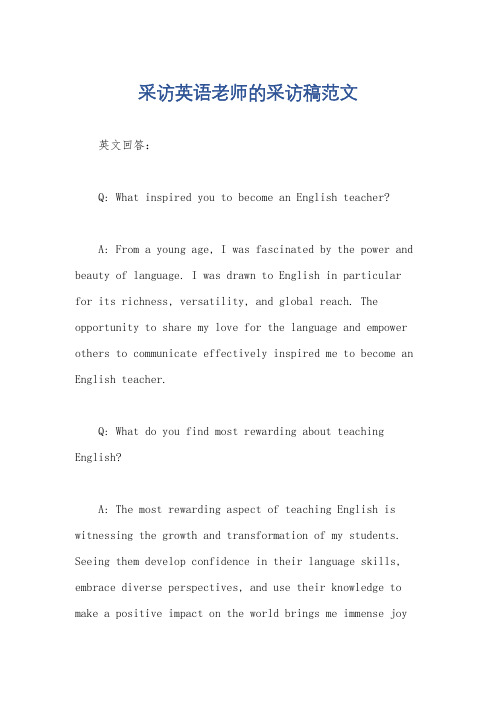
采访英语老师的采访稿范文英文回答:Q: What inspired you to become an English teacher?A: From a young age, I was fascinated by the power and beauty of language. I was drawn to English in particular for its richness, versatility, and global reach. The opportunity to share my love for the language and empower others to communicate effectively inspired me to become an English teacher.Q: What do you find most rewarding about teaching English?A: The most rewarding aspect of teaching English is witnessing the growth and transformation of my students. Seeing them develop confidence in their language skills, embrace diverse perspectives, and use their knowledge to make a positive impact on the world brings me immense joyand fulfillment.Q: What are some challenges that you face as an English teacher?A: One challenge is catering to the diverse needs of students with varied learning styles and backgrounds. Additionally, the ever-changing nature of language and the need to keep abreast of the latest teaching methodologies can be demanding. However, these challenges also provide opportunities for professional growth and innovation.Q: What advice would you give to aspiring English teachers?A: To aspiring English teachers, I would emphasize the importance of fostering a lifelong love of learning. Stay curious, explore new ideas and perspectives, and immerse yourself in the world of language. Cultivate strong communication skills, and be passionate about sharing your knowledge with others. Remember, the impact you make on your students can extend far beyond the classroom.Q: What are your thoughts on the future of English language education?A: The future of English language education is bright and充滿希望. As globalization continues, English will remain a vital tool for communication, and its importancein fields such as education, business, and technology will only increase. I believe that English teachers willcontinue to play a crucial role in empowering learners and fostering global understanding.中文回答:问,是什么激发了您成为一名英语老师?答,从很小的时候开始,我就对语言的力量和美妙之处着迷。
英语采访稿对话式范文关于公开课的收获
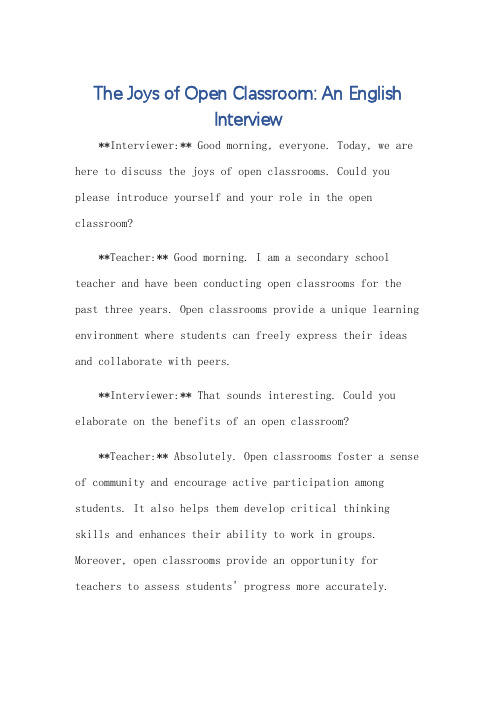
The Joys of Open Classroom: An EnglishInterview**Interviewer:** Good morning, everyone. Today, we are here to discuss the joys of open classrooms. Could you please introduce yourself and your role in the open classroom?**Teacher:** Good morning. I am a secondary school teacher and have been conducting open classrooms for the past three years. Open classrooms provide a unique learning environment where students can freely express their ideas and collaborate with peers.**Interviewer:** That sounds interesting. Could you elaborate on the benefits of an open classroom?**Teacher:** Absolutely. Open classrooms foster a sense of community and encourage active participation among students. It also helps them develop critical thinking skills and enhances their ability to work in groups. Moreover, open classrooms provide an opportunity for teachers to assess students' progress more accurately.**Interviewer:** How do you ensure discipline in an open classroom?**Teacher:** Discipline in an open classroom is maintained through clear guidelines and mutual respect among students. Teachers also play a crucial role bysetting clear expectations and providing timely feedback. Additionally, open classrooms encourage students to take ownership of their learning, which further contributes to maintaining discipline.**Interviewer:** How do students react to this open learning environment?**Teacher:** Students generally respond very positively to the open learning environment. They are more engaged and motivated to learn in such a setting. They also appreciate the freedom to express their ideas and collaborate with peers. However, it is essential to strike a balance between freedom and responsibility to ensure the effectiveness of the open classroom.**Interviewer:** Could you share any successful examples or case studies from your open classroom experience?**Teacher:** Absolutely. One of my students, who was initially reluctant to participate in class discussions, bloomed in the open classroom environment. She became more confident and proactive, actively contributing to group discussions and projects. This transformation not only boosted her academic performance but also enhanced her social skills and sense of belonging.**Interviewer:** That's indeed encouraging. What challenges do you face in conducting open classrooms?**Teacher:** Conducting open classrooms can be challenging, especially in terms of managing the flow of the discussion and ensuring that all students are actively involved. Sometimes, students may get carried away with their own ideas and ignore the contributions of others.It's crucial to strike a balance between encouraging free expression and fostering a culture of respect and inclusivity.**Interviewer:** How do you overcome these challenges? **Teacher:** Overcoming these challenges requires constant monitoring and adjustment of strategies. I often facilitate group discussions by ensuring that everyone hasa chance to speak. I also encourage students to provide feedback on the classroom environment and suggest improvements. Additionally, I collaborate with other teachers to share strategies and best practices for managing open classrooms effectively.**Interviewer:** Thank you for sharing your insights on the joys of open classrooms. It's indeed a valuable learning experience for both students and teachers.**Teacher:** You're welcome. I believe that open classrooms have the potential to revolutionize education by fostering a more inclusive and collaborative learning environment. I'm excited to see where this journey takes us next.**公开课的收获:一次英语采访****采访者**:早上好,各位。
采访稿英语作文
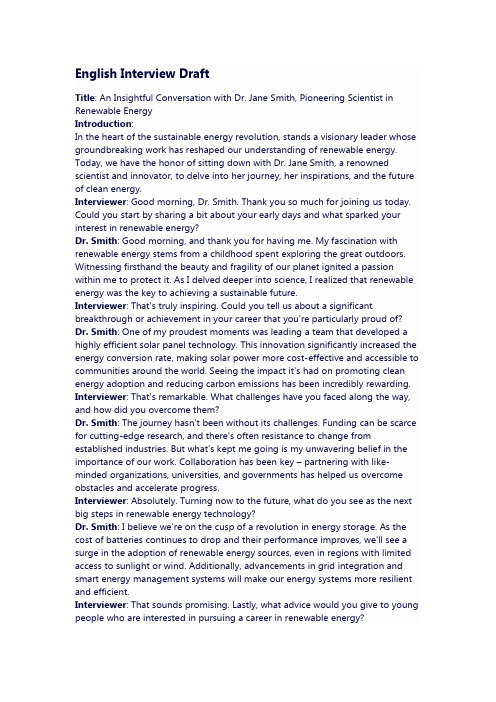
English Interview DraftTitle: An Insightful Conversation with Dr. Jane Smith, Pioneering Scientist in Renewable EnergyIntroduction:In the heart of the sustainable energy revolution, stands a visionary leader whose groundbreaking work has reshaped our understanding of renewable energy. Today, we have the honor of sitting down with Dr. Jane Smith, a renowned scientist and innovator, to delve into her journey, her inspirations, and the future of clean energy.Interviewer: Good morning, Dr. Smith. Thank you so much for joining us today. Could you start by sharing a bit about your early days and what sparked your interest in renewable energy?Dr. Smith: Good morning, and thank you for having me. My fascination with renewable energy stems from a childhood spent exploring the great outdoors. Witnessing firsthand the beauty and fragility of our planet ignited a passion within me to protect it. As I delved deeper into science, I realized that renewable energy was the key to achieving a sustainable future.Interviewer: That's truly inspiring. Could you tell us about a significant breakthrough or achievement in your career that you're particularly proud of? Dr. Smith: One of my proudest moments was leading a team that developed a highly efficient solar panel technology. This innovation significantly increased the energy conversion rate, making solar power more cost-effective and accessible to communities around the world. Seeing the impact it's had on promoting clean energy adoption and reducing carbon emissions has been incredibly rewarding. Interviewer: That's remarkable. What challenges have you faced along the way, and how did you overcome them?Dr. Smith: The journey hasn't been without its challenges. Funding can be scarce for cutting-edge research, and there's often resistance to change from established industries. But what's kept me going is my unwavering belief in the importance of our work. Collaboration has been key – partnering with like-minded organizations, universities, and governments has helped us overcome obstacles and accelerate progress.Interviewer: Absolutely. Turning now to the future, what do you see as the next big steps in renewable energy technology?Dr. Smith: I believe we're on the cusp of a revolution in energy storage. As the cost of batteries continues to drop and their performance improves, we'll see a surge in the adoption of renewable energy sources, even in regions with limited access to sunlight or wind. Additionally, advancements in grid integration and smart energy management systems will make our energy systems more resilient and efficient.Interviewer: That sounds promising. Lastly, what advice would you give to young people who are interested in pursuing a career in renewable energy?Dr. Smith: My advice would be to stay curious, be persistent, and never underestimate the power of collaboration. Keep up-to-date with the latest research and trends, but also remember to think creatively and challenge conventional wisdom. Most importantly, find a cause you're passionate about and work tirelessly to make a difference.Interviewer: Thank you, Dr. Smith, for your insightful words and for your invaluable contributions to the field of renewable energy. It's been a pleasure speaking with you.Dr. Smith: The pleasure is all mine. Thank you for the opportunity.中文翻译:标题:与可再生能源领域先驱科学家简·史密斯博士的深刻对话引言:在可持续能源革命的浪潮中,有一位具有远见卓识的领导者,她的开创性工作重塑了我们对可再生能源的理解。
英语采访稿对话式范文

英语采访稿对话式范文
《英语采访:对话式范文》
主持人:大家好,欢迎收听我们的采访节目。
今天我们有幸邀请到一位英语教育专家,一起探讨英语采访的技巧和要领。
欢迎您!
专家:谢谢邀请,我很高兴能和大家分享我的经验和见解。
主持人:首先,能不能请您介绍一下您自己和您的教育背景?
专家:当然。
我是一位在英语教育领域有多年经验的教师,我曾在多所知名语言学校任教,并且参与了许多英语采访的培训工作。
主持人:那么,您认为在英语采访中,最重要的是什么?
专家:我觉得最重要的是要有自信和流利的口语表达能力。
另外,也要在平时多加练习,练习聆听和回答问题的技巧。
主持人:那么,您有没有一些具体的练习方法可以分享给我们?
专家:当然。
首先,可以模仿英语节目中的采访对话,跟着音频练习语调和表达方式。
其次,可以找一个英语母语人士做练习对象,模拟真实的采访场景进行练习。
主持人:在英语采访中,有没有一些常见的错误是需要避免的?
专家:是的,有一些常见的错误需要注意。
比如,在回答问题时避免使用太多的“um”和“uh”,还有要避免使用太复杂和专业的词汇,尽量用简单直接的语言来表达。
主持人:那么,您觉得英语采访对于提高英语水平有帮助吗?
专家:当然有帮助。
通过参与英语采访,可以提高听力和口语能力,让学生更好地理解和运用英语。
主持人:非常感谢您的分享和建议,谢谢您!
专家:不用谢,我很高兴能分享这些经验。
希望大家能在英语采访中有所收获。
英语简单采访稿范文
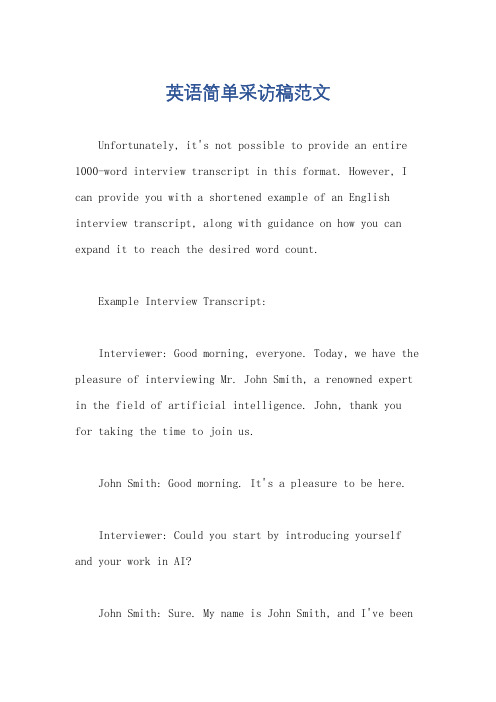
英语简单采访稿范文Unfortunately, it's not possible to provide an entire 1000-word interview transcript in this format. However, I can provide you with a shortened example of an English interview transcript, along with guidance on how you can expand it to reach the desired word count.Example Interview Transcript:Interviewer: Good morning, everyone. Today, we have the pleasure of interviewing Mr. John Smith, a renowned expert in the field of artificial intelligence. John, thank youfor taking the time to join us.John Smith: Good morning. It's a pleasure to be here.Interviewer: Could you start by introducing yourself and your work in AI?John Smith: Sure. My name is John Smith, and I've beenworking in the field of artificial intelligence for over two decades. My main focus has been on developingintelligent systems that can learn and adapt, similar to the way humans do.Interviewer: That's fascinating. Could you tell us about a recent project you've been involved in?John Smith: Absolutely. Recently, my team has been working on a project aimed at creating a more natural interaction between humans and machines. We're exploring ways to make machines more empathetic and understanding, so they can better understand and respond to human emotions.Interviewer: That sounds innovative. What challenges have you faced in this process?John Smith: One of the main challenges has been teaching machines to understand and interpret human emotions accurately. Emotions are complex and subjective, so it's been a continuous process of trial and error.Interviewer: And how do you overcome these challenges?John Smith: We approach it from multiple angles. We conduct extensive research, experiment with different algorithms, and collaborate with experts in psychology and neuroscience to gain a deeper understanding of how humans process emotions.Interviewer: That's quite a comprehensive approach. What do you see as the future of AI in terms of its impact on society?John Smith: I believe AI has the potential to bring transformative changes to society. It can help solve complex problems like climate change, improve healthcare, and enhance our daily lives in countless ways. However,it's crucial that we approach AI responsibly, ensuring it benefits everyone, not just a privileged few.Interviewer: Thank you, John, for sharing your insights with us. It's been a pleasure having you on our show.John Smith: Thank you for having me. It was a pleasure.Interviewer: And that's all for today. Stay tuned for more interviews with leading experts in various fields. Good day, everyone.End of Interview.Guidance on Expanding the Transcript:To expand this transcript to 1000 words, you can delve deeper into each topic John Smith discusses. For example, you can ask him more specific questions about his recent project, the challenges he faced, and how he overcame them. You can also explore his thoughts on the future of AI in more detail, discussing potential applications, ethical considerations, and societal impacts.Additionally, you can include more personal anecdotes, quotes, and examples to bring the interview to life. You can also provide background information on John Smith's career, achievements, and contributions to the field of AI.Remember to maintain a conversational tone and keep the language clear and accessible to a general audience. Finally, ensure that the transcript ends with a formal closing and thanks to the interviewee.。
大学英语采访稿对话式范文
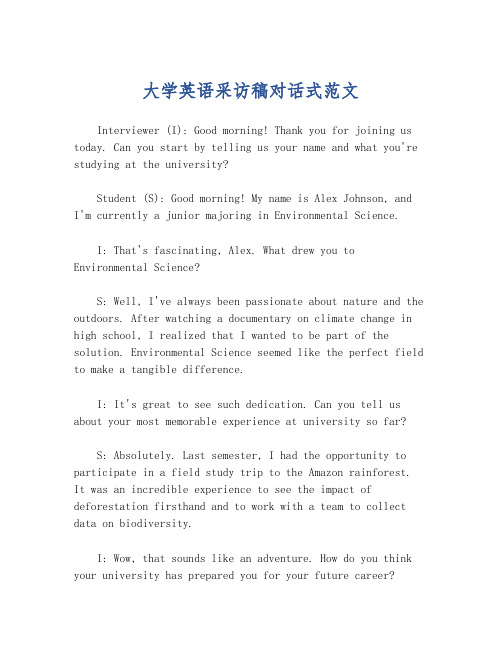
大学英语采访稿对话式范文Interviewer (I): Good morning! Thank you for joining us today. Can you start by telling us your name and what you're studying at the university?Student (S): Good morning! My name is Alex Johnson, and I'm currently a junior majoring in Environmental Science.I: That's fascinating, Alex. What drew you to Environmental Science?S: Well, I've always been passionate about nature and the outdoors. After watching a documentary on climate change in high school, I realized that I wanted to be part of the solution. Environmental Science seemed like the perfect field to make a tangible difference.I: It's great to see such dedication. Can you tell us about your most memorable experience at university so far?S: Absolutely. Last semester, I had the opportunity to participate in a field study trip to the Amazon rainforest.It was an incredible experience to see the impact of deforestation firsthand and to work with a team to collect data on biodiversity.I: Wow, that sounds like an adventure. How do you think your university has prepared you for your future career?S: The university has been really supportive. We have a strong program with a lot of hands-on learning. I've alsobeen able to get involved in research projects andinternships that have given me practical experience. Thecareer services have been helpful too, with workshops on resume building and interview skills.I: It seems like you're well on your way. What advice would you give to freshmen who are just starting their university journey?S: I'd say get involved early. Join clubs, participate in activities, and don't be afraid to step out of your comfort zone. It's also important to find a good balance between studying and social life. College is not just about academics; it's about personal growth and making lifelong friends.I: Those are great tips. Lastly, what are your plansafter graduation?S: I'm considering going for a master's degree to deepen my knowledge in environmental policy. Eventually, I'd love to work for an organization focused on sustainability and conservation.I: Alex, it's been a pleasure talking to you. Thank youfor sharing your experiences and insights with us.S: Thank you for having me. It's been a greatconversation!。
英语简单采访稿范文
英语简单采访稿范文Title: A Day in the Life of a Local Artist.Introduction:In this exclusive interview, we delve into the world of a local artist, exploring their daily routine, inspirations, and challenges faced in the creative industry. Join us aswe uncover the fascinating journey of [Artist's Name], a talented individual who has made a name for themselves in the art world.Interviewer: Good morning, [Artist's Name]. Thank youfor taking the time to speak with us today.Artist: Good morning, it's a pleasure to be here.Interviewer: Could you start by telling us a bit about yourself and your artistic journey?Artist: Sure, I've been creating art for as long as I can remember. It's always been a part of my life, a way to express myself and connect with the world. I started out doing paintings and drawings, but over time, I've experimented with different mediums and techniques. Now, I work primarily with mixed media, combining different elements to create unique and engaging pieces.Interviewer: What's a typical day like for you as an artist?Artist: Every day is different, which is what I love about being an artist. Sometimes, I'll start the day with a cup of coffee and some sketches, trying to capture ideas and inspirations that come to me. Other days, I'll be in my studio, working on a larger project, painting or collaging for hours. I also spend a lot of time researching and exploring new techniques and materials.Interviewer: What inspires you the most when it comes to your art?Artist: There are so many things that inspire me. Nature, culture, people, and everyday life are all sources of inspiration. I find beauty in the smallest of things and try to translate that into my work. Sometimes, I'll get inspiration from other artists or artworks that I see, and that can lead me to experiment with new ideas and techniques.Interviewer: What are some of the challenges you face as an artist?Artist: There are definitely challenges. One of the biggest ones is the constant pressure to create and produce new work. As an artist, you're always trying to push yourself and experiment, which can be stressful at times. There's also the issue of making a living from your art, which can be difficult, especially when you're first starting out. But I believe that the rewards outweigh the challenges, and that's what keeps me going.Interviewer: How do you deal with those challenges and stay motivated?Artist: For me, staying motivated is about finding a balance. I make sure to take time for myself, to relax and recharge, because without that, the creative juices can dry up. I also surround myself with people who support me and my art, who believe in me and鼓励我继续前进。
英语作文采访稿子范文模板
英语作文采访稿子范文模板Interviewer: Welcome to our interview, [Interviewee's name]. Thank you for taking the time to talk to us today.Interviewee: It's my pleasure to be here.Interviewer: So, let's start with your background. Tell us a little bit about yourself.英文回答:I grew up in a small town in China. My parents were both teachers, and they instilled in me the importance of education. I excelled in school, and after graduating from high school, I went on to attend Peking University, where I studied economics. After graduating from university, I worked as an investment banker for several years before deciding to pursue my passion for writing.中文回答:我出生在中国的江苏省徐州市,小时候家境一般,父母都是老师,不过他们都很疼爱我。
从小他们就培养我读书的习惯,告诉我好好学习才能改变命运。
我也算争气,一直是班上的前几名,高中毕业后就考上了北京大学,被分配到经济系。
毕业后我在一家投资银行工作了几年,不过后来发现自己对文字的兴趣更大,就辞职开始从事写作。
Interviewer: Your latest book, "The Three-Body Problem", has been a huge success. Can you tell us a little bit about it?英文回答:The Three-Body Problem is a science fiction novel that tells the story of humanity's first contact with an alien civilization. The novel is set in the near future, and it follows the lives of three Chinese scientists who aretasked with the responsibility of making contact with the aliens. The novel explores the themes of science, technology, and the nature of humanity.中文回答:《三体》是一部关于人类和外星文明首次接触的科幻小说。
大学生英语采访稿范文
大学生英语采访稿范文英语采访稿范文- Interview with a University Student about their Academic JourneyInterviewer: Hello, could you please introduce yourself and tell us what you study at university?Student: Hi, my name is [Your Name], and I am currently pursuing a degree in [Your Major] at [Your University].Interviewer: That sounds interesting. Could you tell us why you chose this major?Student: Absolutely. I've always been fascinated by [Reasons for Choosing the Major]. The courses and the opportunities in this field align with my interests and career aspirations.Interviewer: What has been your most challenging aspect of university studies?Student: For me, the most challenging part has been [Challenges Faced]. Balancing assignments, exams, and extracurricular activities can be quite demanding, but it's also been a great learning experience.Interviewer: How do you manage your time effectively to cope with these challenges?Student: Time management is crucial. I usually plan my week ahead, prioritizing tasks and setting realistic goals. I also make sure to allocate some time for self-care and relaxation.Interviewer: What has been your favorite moment or experience at university?Student: One of my favorite moments was [Favorite Moment or Experience]. It not only gave me valuable skills but also allowed me to connect with people from different backgrounds.Interviewer: Lastly, what advice would you give to incoming university students?Student: I would advise incoming students to be open to new experiences, explore their interests, and take advantage of the resources available. Also, don't be afraid to ask for help when needed.翻译采访者:你好,请你介绍一下自己并告诉我们你在大学学什么?学生:嗨,我叫[你的名字],目前正在[你的大学]攻读[你的专业]学位。
英语采访稿对话式范文
英语采访稿对话式范文English:Reporter: Good morning, Mr. Smith. Thank you for taking the time to speak with us today.Mr. Smith: Good morning, it's my pleasure.Reporter: Can you tell us about the goals of your company for the upcoming year?Mr. Smith: Certainly. Our main goal for the upcoming year is to continue expanding our market share while also focusing on sustainable business practices. We want to increase our presence in international markets and establish ourselves as a leader in our industry. At the same time, we are committed to reducing our environmental impact and implementing more eco-friendly processes in our operations.Reporter: That sounds very ambitious. How do you plan on achieving these goals?Mr. Smith: We have a comprehensive strategy in place that involves strategic partnerships, new product developments, and targeted marketing efforts. We also have dedicated teams working on research and development to ensure that we stay at the forefront of innovation in our industry. Additionally, we are making significant investments in renewable energy and waste reduction initiatives to align with our sustainability goals.Reporter: It's great to hear about your company's commitment to sustainability. What are some specific steps you have taken in that area?Mr. Smith: We have implemented energy-efficient measures in our production facilities, such as installing solar panels and utilizing energy-saving technologies. We have also switched to more sustainable packaging materials and are working towards reducing our overall carbon footprint. Furthermore, we are actively engaging with our suppliers and partners to promote responsible sourcing and ethical business practices throughout our supply chain.中文翻译:记者:早上好,史密斯先生。
- 1、下载文档前请自行甄别文档内容的完整性,平台不提供额外的编辑、内容补充、找答案等附加服务。
- 2、"仅部分预览"的文档,不可在线预览部分如存在完整性等问题,可反馈申请退款(可完整预览的文档不适用该条件!)。
- 3、如文档侵犯您的权益,请联系客服反馈,我们会尽快为您处理(人工客服工作时间:9:00-18:30)。
急!!!求一份英语采访稿谢谢大家啊
英语采访对话范文
帮忙翻译一篇英文采访稿
一楼的,你没心思翻译也不能在网上随便弄一下就拿来误导别人啊!
我来试试,按初一的水平。
Today, I will talk to an english teacher. His name is Leon.
Hello, can you give me five minutes. I want to ask you some questions about english.
Q1: to you students, do you have special ways to teach them?
Q2: as an english teacher, what do you proud of most?
Q3: when you teach english, do you have any difficulty?
Q4: now many students can get a high score, but they can just speak a little. What is the reason?
Q5: in the world, english is the mother language of six countries, and eighty countries use it as a second language. So it is very important and Chinese people study it very hard. But a lot of students can not learn it well. So what do you think is the most important thing to learn english well?
Q6: do you think listening to english music can help us study english? Can you give us a example? English TV shows? Cartoons? Or movies?
Q7: which age do you think is the best for a child to study english? If too early, will it be a bad thing for the children mother language?
Q8: now, many children study english very early and their english is better than chinese. How do you think about this?
Thank you very much. I think this will help us a lot in studying english. God bye
这已经是我能想出来的最简单的句子了,我想对一个初中生来说,成绩好点的,靠积累和查查
字典差不多也有这水平了。
受不受用就看自己的爱好了!
【英语采访稿(演讲)采访介绍你的朋友爱好、饮食等等】
由浅入深地提问,采用一问一答形式.内容以老师与班级、教学间的关系为主.1 介绍采访的目的,采访对象,时间、地点这些新闻要件.2 正文.格式:记者:(提问)XX老师:(作答)一般是
原话录入,也可以在征得采访对象的同意后,整理后写出.3 采访内容:a 同学们不大熟悉的老师,如老师的兴趣爱好,严厉的老师下课后温和可爱的另一面,老师备课的辛苦等等.b 老师对
于班级、同学的看法,当某老师任教几个班级的时候,不要要求他对几个班级的成绩作比较,
也不要拿特定的同学来说事.问的最好是一个整体对象,如:您认为班上同学应该从哪些方面入手培养自己的兴趣爱好呢?c 问老师关于社会热点的看法,如:让学生过早接触互联网好不好?如何在小学阶段锻炼自己独立思考、积极创新的意识?d 老师的建议、规划、祝福等.如谈谈新
学年的新教学方法,过节时老师对大家的祝福.4 记者小结:“通过这次采访,我们更加深入的
了解了老师和他们对于同学的期待、对于未来的理想;也对教育教学有了更深刻的认识.总结成果如下:.希望在新学年中,老师和同学在各自的领域都能取得更好成绩!。
英语采访稿应该怎样写?
英语采访对话范文
急求英文采访稿一篇!!!
接下来~~55555真是惭愧啊!!居然听不下来~~到底是英国人~~偶荒废了N年的英音啊啊啊啊…….不过最后关键的一句被我听到了~~估计熊和偶一样~~暗爽一下~
Michael:(重重的一记傻笑!) hehehehe ….. it was a German song , and.. I dont know the title (这德国调重的~~) but… nobody understand it whats good for me (又笑!!傻巴~).. (Chelsea field for photo opportunity….. )
Reporter:……….^*)^*&%*^$(&_)(+_)(_)*([email protected]
. (又哭….大概就是问对冠军联赛有什么期待~~)
Michael: first… we look for the season …because thats important….because Italian….during the season.. very famous….i think the national title and(看来熊是一生也忘不了那场伤心赛了55555陪着我的熊熊`)….ja…after this, were looking for the champions league(熊做梦都在念叨的词儿),…..we had a great team ,also with six, seven, eight(我数我数数数…..)…..other teams in Europe they can win the champions league.(老这么捧人家~~~)..and .yeah…its
(&^*&_(*+)_()_)((*……(翻译终于终于终于忍不住了…熊也忍不住了.) great challenge for me and ,er…our team to win this……
急求成功人士访谈录稿英文的
他克服了众多障碍而取得的成就特别令人印象深刻。
他是单亲妈妈在哥伦比亚带大的,14岁时,妈妈中了流弹受了伤。
佩雷斯干三份活养家。
但他一直想把自己热心专注的舞蹈改变成一样与众不同的东西。
然而,他没钱上课,缺乏正规训练,但他用天生的未经锤炼的才能取而代之。
19岁时,他在全国兰巴达贴身舞比赛中获胜。
一个学生要佩雷斯见见儿子埃尔伯德.博尔曼。
当时,博尔曼24岁,在做有关互联网新企业的分析。
他和佩雷斯一拍即合。
,With no money or experience, the partners needed to showcase Perezs talents. They spent a night laying down plywood boards on Sunny Isles Beach, then invited Perezs students to take a $20 class that they would film and show to potential investors. But after September 11, 2001, all leads dried up. Eventually, they made an infomercial, which sold
about a million DVDs in six months.没有钱也没有经验,合伙人只有展现佩雷斯的才能。
他们花了一个晚上在太阳岛海滩搭了木台,然后请来佩雷斯的学生出20美金上课,他们把课堂拍成片子给有兴趣的投资人看。
但是,2001年9.11 以后,所有资源都干竭了。
2003年,合伙人以佛州好莱坞市为基地,开设了第一个训练班,此后在全球建立了教练群。
每个月付30美金,这些人就可以加入尊巴舞教练网,刊登课程表,得到新音乐和舞蹈方法。
